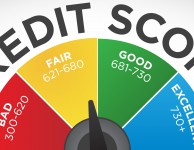The Truth Behind These 3 Credit Score Myths
If you have ever been worried about your credit score, you are in good company. The American Bankers Association reported that 60 percent of Americans checked their credit score online in 2014. However, though most people know they have access to free annual credit reports, 44 percent said they believed a credit score and a credit report were the same thing. With this myth and several other commonly-believed falsehoods, it’s important for Americans to finally get the facts straight.
Credit Reports Are Not Credit Scores
While many believe these two terms are synonymous with each other, they are actually two completely different things. A credit report contains data about your financial history, U.S. & World News Report explained. The report has information about your bill payment history and patterns, what type of credit you use, how much new credit you have and any bankruptcy information. Consumers can request a free credit report every year from Experian, TransUnion or Equifax. People are encouraged to take advantage of this service to remedy any errors that might be included in the report.
A credit score, on the other hand, is a value determined by a formula which takes into account the information that is found in a credit report. There are many ways to calculate such a score, but the most well-known is the formula used by FICO. This software company calculates a value between 300 and 850. Lenders prefer to work with people on the higher end of the scale; low credit scores usually mean high risk.
The FICO score take into account five factors. The most important is your payment history, which accounts for 35% of the credit score. The amount of debt you have takes up another 30% of the score. Lastly, how long you have had credit, how many types of credit you have and any new credit all contribute to the final score as well.
While it is important to keep your credit score high, it’s not always easy to know what it is. It’s true that credit reports can be obtained free of charge every year, but they don’t necessarily contain your actual credit score – unless you’re willing to pay extra.
It Doesn’t Hurt To Check
Though most people know they have access to a free credit report online each year, many still believe making an inquiry will hurt their credit. According to Credit Sesame, this isn’t always the case. What many people don’t know is there are two kinds of inquiries: hard and soft.
A hard inquiry is the type a creditor will make when checking your credit score. A lender will do this only when you apply for credit. They want to see what your score is to determine if you are a high risk or a low one.
The formula to determine a credit score includes information about any new credit you take out. Since you are asking for new credit, your score will automatically go down. However, this doesn’t mean lenders will begin turning you away. If you are looking for an auto loan, for instance, every time you see a new lender during a 45-day period, every inquiry counts as one in terms of your credit score; lenders can clearly see that you are asking for the same product and comparing options. Plus, the damage it does won’t last forever. It will stay on your credit report for two years and will only be included in your credit score calculation for one.
A soft inquiry is different than this because it isn’t spurred by an interest in opening new credit. They are made by you, an insurance company or a credit card company looking to see how your score is doing. This type of inquiry won’t affect your credit score. In fact, it might be a good idea to look into it occasionally. Your credit score can be a deciding factor when want to move into a new apartment or if you will need more credit in the future. Knowing your score can help you be prepared for your next big life change.
There Isn’t A Quick & Easy Fix
If you find that your credit score isn’t what you hoped it would be, you aren’t alone. According to an Assets & Opportunity Scorecard study, more than half of Americans have subprime credit scores. This means that for 56% of U.S. citizens, it will be difficult to get a loan.
Many people who find themselves in this situation wonder how they can improve their credit score quickly. According to Bankrate, there are many ways people believe will turn their credit score around in no time, such as paying bills earlier, paying loans off faster and closing old accounts. However, the only real cure for a poor credit score is time and discipline. Begin a payment plan you can stick to, carefully pay off old debts and don’t acquire any new debt. After some time, you will see your score start to improve.
Get helpful hints and tips about improving your credit by subscribing to our email list!






